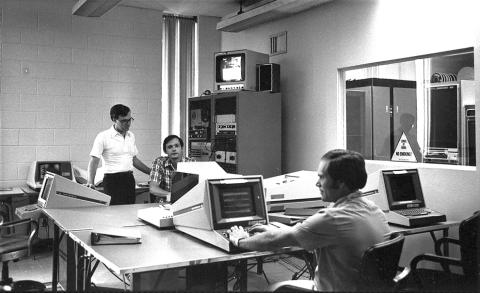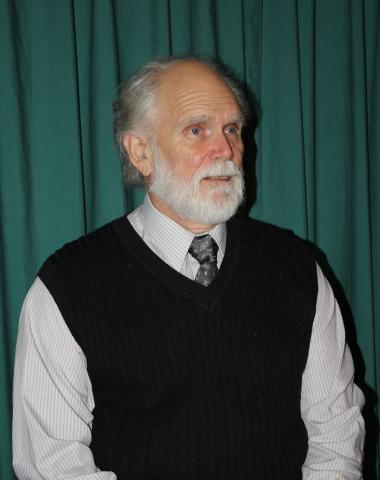ECE Professor Emeritus Thomas P. Barnwell, III will receive the 2014 IEEE Jack S. Kilby Signal Processing Medal, which is given for outstanding contributions in signal processing.
Thomas P. Barnwell, III will receive the 2014 IEEE Jack S. Kilby Signal Processing Medal, which is given for outstanding contributions in signal processing. A Professor Emeritus in the Georgia Tech School of Electrical and Computer Engineering (ECE), Barnwell is being honored “for leadership in and contributions to speech processing, filter banks and wavelets, DSP hardware and architectures, and technology-enhanced education.”
According to the award announcement, “Thomas Pinkney Barnwell, III is considered one of the historically most important contributors to the field of signal processing over the last 50 years for the breadth of his digital signal processing innovations that have advanced the very foundations of the field.” Barnwell will receive this award at the IEEE Sections Congress, scheduled for August 23, 2014 in Amsterdam, The Netherlands.
Barnwell came to Georgia Tech in 1971 and was the School’s first faculty member in the area of digital signal processing (DSP), after receiving his Ph.D. from MIT where he worked on the MIT Reading Machine, the first programmatic attempt to build a machine to read a book out loud as an aid for the visually impaired. His vision at Georgia Tech was to create a broad program that addressed basic unsolved research problems in a context that also emphasized application development, deployment, and education.
Thanks to this approach, Georgia Tech attracted substantial research and development funds and several stellar faculty members in the mid-1970s. This group formed the founding core of the Center for Signal and Image Processing (now known as the Center for Signal and Information Processing), considered one of the world’s most preeminent groups of digital signal processing academic and research faculty. In fact, he is the third faculty member from ECE to receive the Kilby Signal Processing Medal. Previous recipients include ECE Professor James H. McClellan and ECE Regents’ Professor Emeritus Ronald W. Schafer. Barnwell is also credited with creating and managing the DSP Laboratory, which eventually morphed into what is now the ECE Computer Support Group.
“This is a tremendous honor for Tom both personally and professionally, and our amazing faculty track record in receiving this award speaks of the high regard in which our digital signal processing program is held around the world,” said Steven W. McLaughlin, Steve W. Chaddick School Chair of ECE.
Barnwell retired from ECE in 2006 after 35 years of service and held the title of the Arbutus Chair in Distributed Engineering Education and Georgia Research Alliance Eminent Scholar.
Among the first Georgia Tech and ECE faculty members involved in start-up company activity with the Advanced Technology Development Center (ATDC), Barnwell co-founded Atlanta Signal Processors, Inc. (ASPI Digital) in 1981 with Schafer and ECE Regents’ Professor Emeritus Russell M. Mersereau. ASPI, which produced hardware and software tools for DSP algorithm development and multimedia on high-speed microprocessors, graduated from ATDC in 1990 and was acquired by Polycom, Inc. in 2001.
Barnwell and his students are responsible for some of the most important research breakthroughs in DSP over the last three decades:
- The recursive correlation algorithm, also called “Barnwell Windowing,” was included in the ITU G.728 low delay speech coding standard, which has been used worldwide since its development as an important component in the international speech telephony network.
- Maximally decimated perfect reconstruction systems based on filter banks, often called Smith-Barnwell filters, was a fundamental discovery that has powered all subsequent filter bank and wavelet theory. This area is now clearly one of the most important technologies of the late 20th and early 21st centuries, with a myriad of applications in speech, audio, image, video, and many other technology areas. This work was the Georgia Tech Ph.D. research of Mark J.T. Smith, Barnwell’s past student who is now the dean of the Graduate School at Purdue University.
- Barnwell also developed cyclo-static multiprocessor architectures, a class of optimal solutions for many core DSP algorithms on synchronous multiprocessors. This work has increasing value as multiprocessor architectures become more common, and it has already been used for optimizing algorithms on single and multiple DSP processors.
- He and his collaborators developed objective measures for speech quality testing, which led to the first book in this area that was co-authored by Barnwell, ECE Professor Mark A. Clements, and Schuyler R. Quackenbush. Also a past Ph.D. student of Barnwell’s, Quackenbush is currently the chair of the MPEG Audio Subgroup – a position he has held since 1998. This group standardized MP3 and has been the major driving force for audio coding and compression worldwide for the past two decades.
- The invention of MELP (mixed excitation linear predictive coder), a speech coder that led to improved technology for digital transmission and storage of speech signals, was made the new military standard in digital speech compression by the U.S. Department of Defense Digital Voice Processors Consortium in 1996. NATO made this technology its standard in 2002 and has been called the most influential speech coder of the early 21st century. Primarily the Georgia Tech Ph.D. research of Alan McCree, another Ph.D. graduate of Barnwell’s program, it achieved the rare accomplishment in which academic Ph.D. research led directly to a federal and NATO standard, all in less than a decade.
In the mid-1990s after returning from a leave of absence to work at ASPI, Barnwell spearheaded a campuswide effort, led largely by ECE faculty, to create a technology enhanced education program. In 2002, that effort became more formalized with his appointment as director of the new Arbutus Center for Distributed Engineering Education, which created, tested, and distributed new technologies for education applications, as well as content development and education delivery tools to other educational institutions. Through the use of these innovative applications, Georgia Tech has delivered classes to students around the globe and has made the classroom available 24 hours a day, seven days a week.
“It is truly humbling to receive the Jack Kilby Medal, and I was very surprised when I got the news,” Barnwell said. “To me, being part of the DSP revolution of the second half of the 20th century was one of the great adventures of all time, and I was lucky enough to arrive on the scene at exactly the right time.
“In addition, I arrived at exactly the right place, because Georgia Tech in the early 1970s was determined to become a major research institution. The challenges were huge, but so were the opportunities–you cannot ask for more than that,” he continued. “The Georgia Tech DSP research program was (and is) very much a team activity, and being part of that amazing group of faculty and students as they grew to worldwide preeminence has been the joy of my life.”
Additional Images


